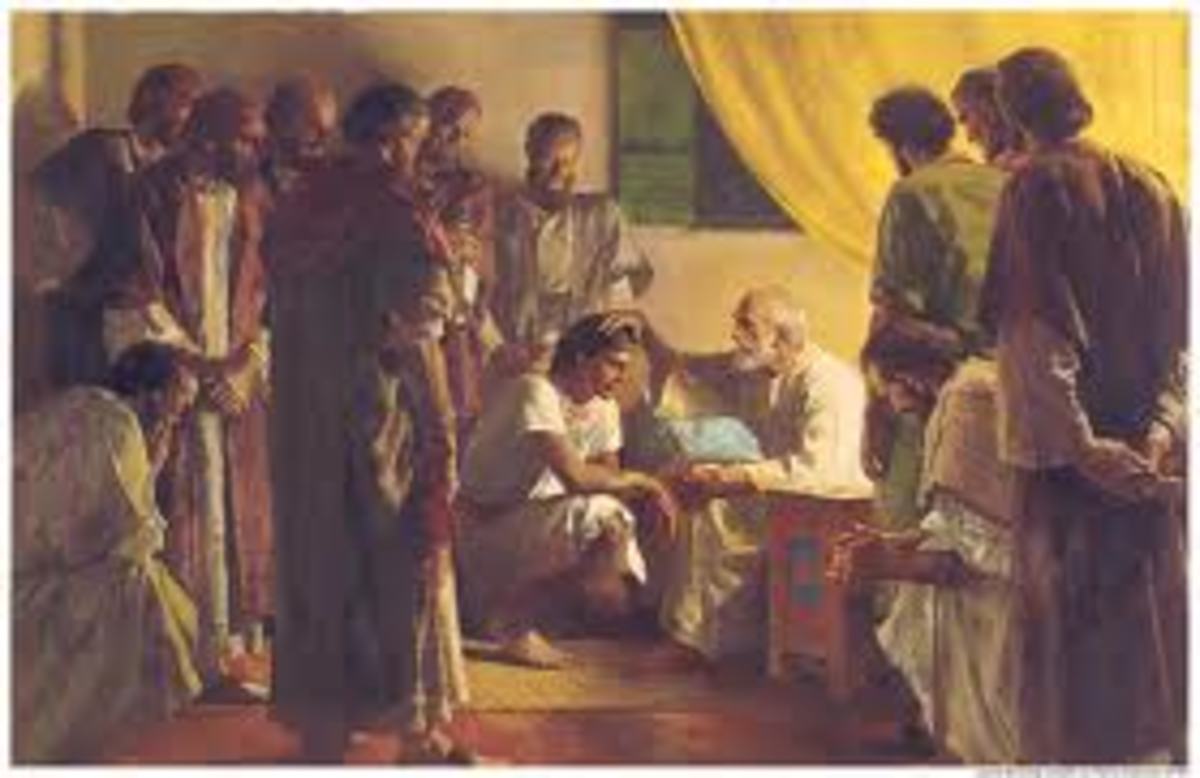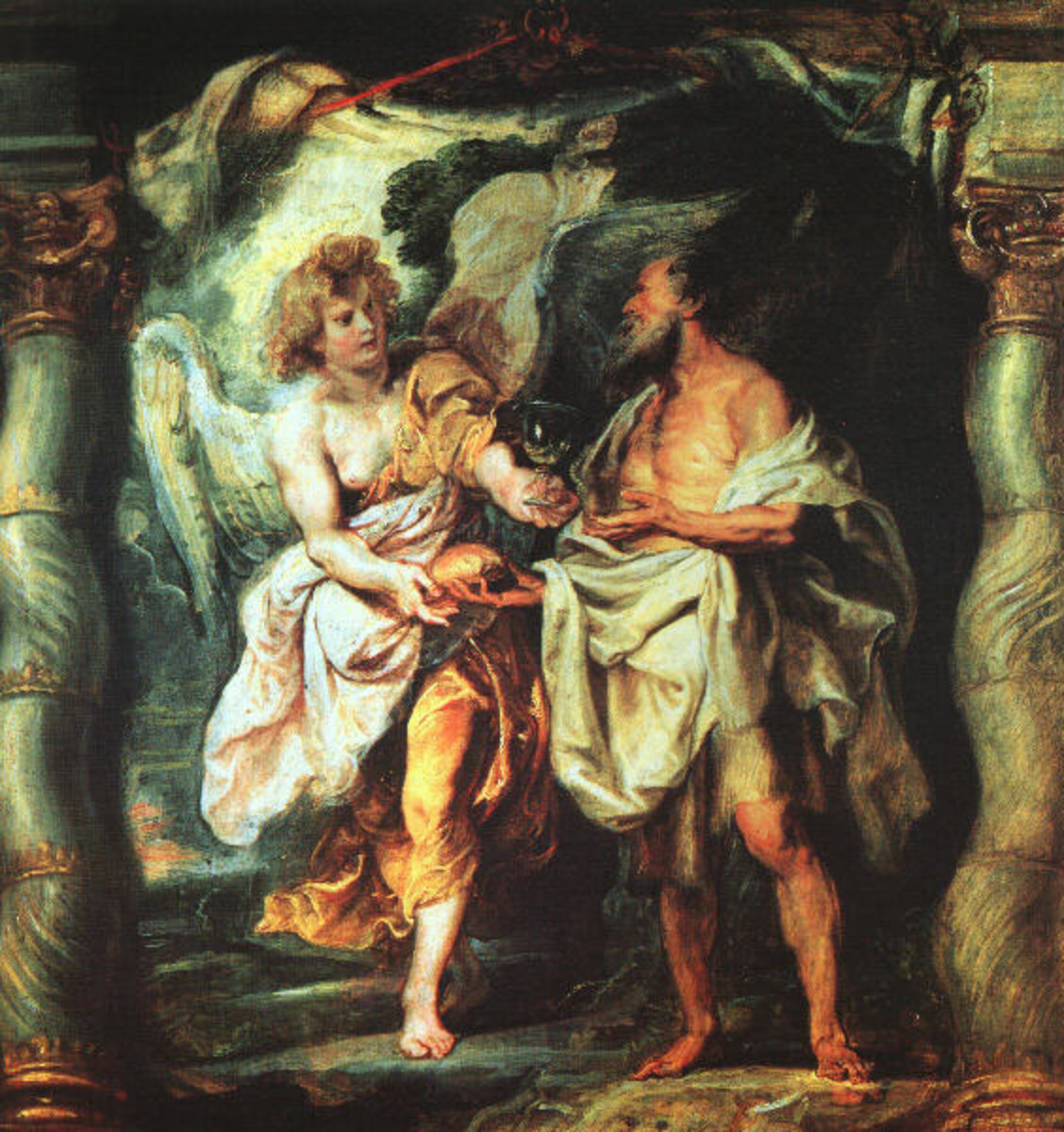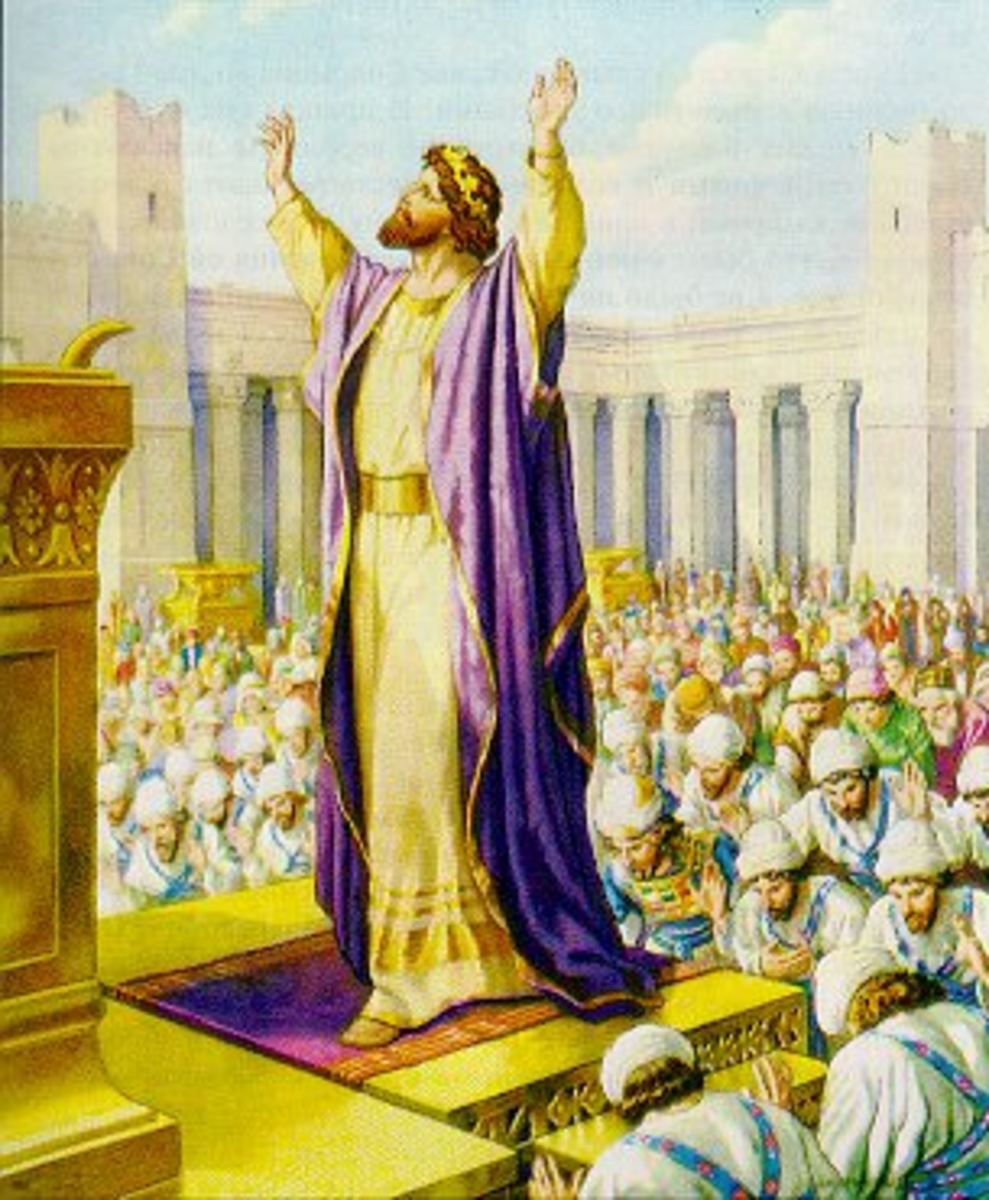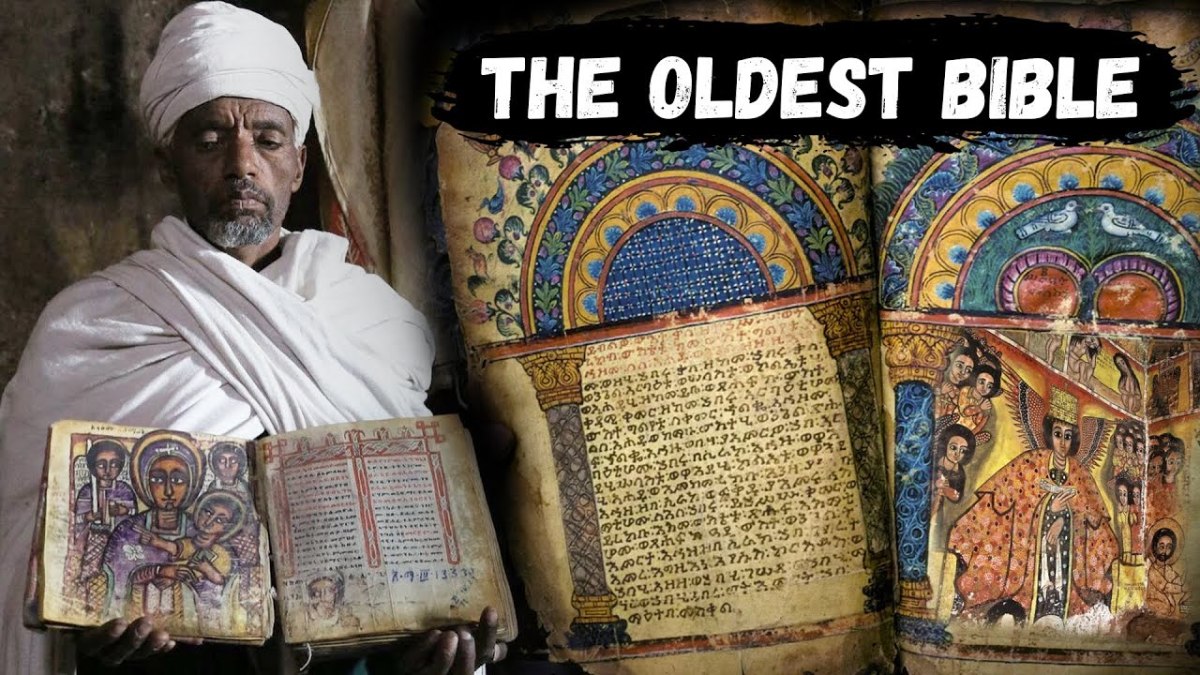Bible: What Does 2 Chronicles 25-32 Teach Us About Loyal Obedience and Prideful Apostasy?
Amaziah
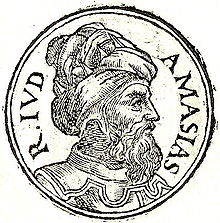
Amaziah: A Righteous Apostate?
[Regarding verse four, see Numbers 16:27 and Deuteronomy 24:16].
Amaziah, king of Judah, hires one hundred thousand warriors from Israel, and a prophet rebukes him (vv. 5-8).
[The text calls this latter figure a "man of God," but does not specify which one].
As the result of this encounter, Amaziah discharges the army before they go to battle, thus nullifying the contract and incensing the infantry (vv. 9-10).
Instead of using "foreign" forces, the king himself goes to execute judgment upon Seir, he and his Judean troops, and they succeed in killing twenty thousand Edomites (vv. 11-12).
However, the discharged soldiers pillage Judean territory in retaliation for the king's unfaithfulness (v. 13).
Amaziah then turns to Edomite gods, so God sends another prophet to rebuke him (vv. 14-16).
Rejecting his wise counsel, the king challenges Jehoash of Israel in battle, and the latter king soundly defeats him (vv. 17-22).
Amaziah's pride and apostasy bring about the destruction of Jerusalem's wall, the confiscation of its treasures, and eventually the king’s own death by assassination (vv. 23-28).
[Verse two states that Amaziah did what was right in the Lord's sight, but he did not do it with a loyal heart.
Does this mean that he was a true believer who later turned away from the LORD?
Is apostasy possible for one designated by Scripture as righteous?]
Uzziah and Leprosy
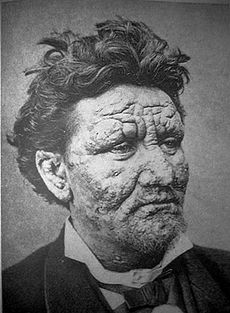
The Outcome of Uzziah's Pride
2 Chronicles 26
Uzziah's story is very similar to that of Amaziah's (vv. 1-5).
When he seeks the LORD, he wins his military battles (vv. 6-8) and becomes prosperous in building towers (vv. 9-10), operating farms (v. 10) and raising a large army (vv. 11-15).
However, once he becomes proud of his accomplishments, he tries to offer incense at the altar, thus violating the Law, since Yahweh delegated that responsibility only to the priests (vv. 16-18).
Therefore, God strikes the king with leprosy while he is visiting the temple (v. 19).
As the result of Uzziah's sin, the priests force him into isolation and make Jotham king (vv. 20-23).
[Again, the instruction here is clear: "Never take credit for accomplishments, for the LORD enables you to achieve whatever He wills."]
Jotham (on the left)

2 Chronicles 27
Verse two communicates a very telling fact: sometimes godly leadership is not enough to turn a nation (or individuals) to God.
Jotham also undertakes an extensive building and repair program (vv. 3, 4), as well as wages a successful military expedition against the Ammonites, who consequently pay him hefty tribute (v. 5).
[It is surprising that the chronicler wrote so little about the career of this godly king who brilliantly managed both domestic and foreign policy].
Ahaz
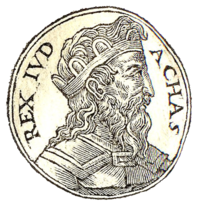
Assyrian Deception
view quiz statisticsTrust Not in Assyria
2 Chronicles 28
The formulaic introduction reports the wicked practices of Ahaz, Jotham's son (vv. 1-4).
[He was king during Isaiah's Immanuel prophecy—late seventh/early eighth century B.C. (cf. Is. 7:14)].
National evil brings death and subjugation to many in Judah through the military triumphs of Syria and Israel (vv. 5-8).
The prophet Oded's warning to Israel's army, holding them responsible for willful killings, prevents it from making slaves of Judah's captives.
Instead, the men of Israel begin to treat their captives with kindness (vv. 9-15).
Ahaz disgraces himself by losing battles to the Edomites and Philistines (vv. 16-18).
Tiglath-Pileser, the Assyrian king, relieves him of his money, but does not lift a finger to help him.
By means of repetition, the chronicler emphasizes this latter point (vv. 20-21).
Ahaz turns his back on the LORD increasingly until his death (vv. 22-27).
[What went wrong in Jotham's family, that a godly king should beget such a wicked apostate?
This example provides further proof that godly fathers do not always produce godly children!]
Hezekiah
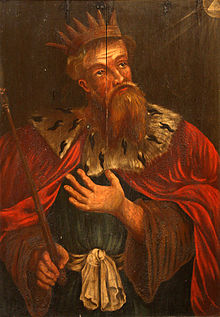
Obedience Brings Revival in Judah
2 Chronicles 29
The next four chapters comprise the Hezekiah material, beginning with the formulaic summary of the king's reign and ending with the announcement of his death (29:1-2; 32:32-33).
[Important note: Hezekiah assembles the priests and Levites—sons of Kohath, Merari, Gershon, Elizaphan, Asaph, Heman, and Jeduthun—to bring the kingdom back to faithfulness (vv. 12-14)].
They cleanse the temple in sixteen days (v. 17), and make atonement offerings for all Israel (vv. 20-24).
After the priests and Levites sacrifice and lead in worship (vv. 25-30), the people come with their offerings (vv. 31-33).
Through God's preparation of the hearts of the people, a revival occurs (v. 36).
[When the LORD's people obey His word, blessing follows].
Dimension of Israel
view quiz statisticsJudah Celebrates a Holy Passover
2 Chronicles 30
Hezekiah attempts to reunite the nation by inviting everyone in Israel—“from Beersheba to Dan” (v. 5)—to celebrate the Passover at the Jerusalem temple (vv. 1-9).
Some from the tribes of Asher, Manasseh, and Zebulun make the journey, and others from Ephraim and Issachar arrive, but a multitude is not ceremonially clean (vv. 10-12).
Through the godly king’s intercession, the LORD graciously heals them (vv. 13-20).
All the people celebrate for twenty-one days at Hezekiah and other leaders' expense; much joyous singing, prayer, and confession take place (vv 21-27).
[It is amazing what the full obedience of one godly leader can do to affect the lives of so many people!]
Worship Reform
2 Chronicles 31
Hezekiah initiates various reforms in Judah and other tribes, ordering the destruction of false worship (v. 1).
He also sets the priesthood straight (vv. 2-3) and commands the people to contribute a tithe of everything, so that not only the needs of the priests but also those of the Levites and other family members in the genealogy, might be abundantly supplied (vv. 4-10).
The rest of the chapter lists individuals from the above categories who benefited from the obedience of the people (vv. 11-21).
[It is evident that when God’s people fully obey, prosperity is not far behind].
Jerusalem and Water
view quiz statisticsThe Angel of the LORD
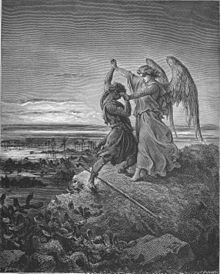
The Destruction of the Assyrian Army
2 Chronicles 32
Sennacherib, king of Assyria, invades Judah, so Hezekiah and the military leaders cut off his water supply (vv. 1-4).
The king also takes other actions to rebuild Jerusalem's defenses architecturally, militarily, and spiritually (vv. 5-8).
Nevertheless, Assyria attacks Jerusalem, yet not with armed forces; Sennacherib sends a diplomatic envoy to relay his terms.
The message he proclaims boasts of the Assyrian's might, recounting the failure of the gods of all the surrounding nations to save their people from him.
Therefore, he tries to persuade Hezekiah and his people to surrender before it is too late (vv. 9-19).
The king consults Isaiah, and together they petition the LORD regarding Sennacherib's threat (v. 20).
In abbreviated fashion, the chronicler relates the judgment of the Angel of the LORD, and Sennacherib's murder by his sons (v. 21; see Is. 36-37 for fuller details of the invasion, the speeches of the envoy, and the destruction of the Assyrian army).
After Hezekiah's victory, he falls ill (v. 24).
The LORD grants him a full recovery; but afterwards, the king becomes proud, neglecting to give God thanks.
Only through his repentance does Hezekiah avert the immediate wrath of the LORD upon the nation (vv. 25-26).
During his reign the king amasses great wealth, and he prospers "in all his works" (vv. 27-30); however, Yahweh tests him with the Babylonian ambassadors (v. 31; cf. Is. 39).
Manasseh, one of the most evil kings of Judah, reigns after Hezekiah (v. 33).
[As is so often the case, defeat follows victory because the blessed one becomes proud.
In addition, the birth of Manasseh after Hezekiah's recovery is a fascinating development.
What might have been had he never been born]!
© 2014 glynch1

